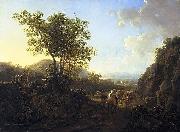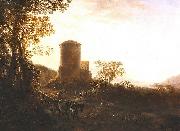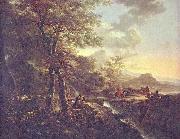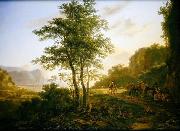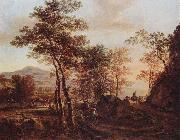Jan Both Oil Painting ReproductionAll Jan Both Oil PaintingsJan Dirksz Both (between 1610 and 1618 - August 9, 1652) Jan Both was a Dutch painter, draughtsman, and etcher, who made an important contribution to the development of Dutch Italianate landscape painting. Both was born in Utrecht, and was the brother of Andries Both. According to Houbraken, the brothers first learned to paint from their father, who was a glass-painter or glazier there. Later Jan was a pupil of Abraham Bloemaert and still later the brothers traveled together to Rome via France. Gerrit van Honthorst has also been suggested as a teacher. By 1638 Jan and his brother Andries were in Rome where Andries concentrated on genre works in the manner of Pieter van Laer, while Jan concentrated on landscapes in the manner of Claude Lorrain.[1] In 1639 Jan collaborated with Herman van Swanevelt and Claude Lorrain on a project for the Buen Retiro Palace in Madrid. Certainly by 1646 Jan had returned to Utrecht, where he refined further his expansive, imaginary landscapes drenched with a Mediterranean golden light. In Landscape with Bandits Leading Prisoners (Museum of Fine Arts, Boston) the sandy road makes a sweeping diagonal from the left. Touches of realism in the down-to-earth figures and detailed vegetation of the foreground contrast with the idyllic golden distance. Occasionally Both peoples his landscapes with religious or mythological figures as in Judgement of Paris (London, National Gallery) where the figures were painted by a fellow Utrecht artist, Cornelis van Poelenburch. Jan's brother Andries (c.1612-41), who specialised in peasant scenes, died in Venice as they were returning to Utrecht. |
|||

|
|||
|
|
|||
|
||||||||
| Jan Both Jan Dirksz Both (between 1610 and 1618 - August 9, 1652) Jan Both was a Dutch painter, draughtsman, and etcher, who made an important contribution to the development of Dutch Italianate landscape painting. Both was born in Utrecht, and was the brother of Andries Both. According to Houbraken, the brothers first learned to paint from their father, who was a glass-painter or glazier there. Later Jan was a pupil of Abraham Bloemaert and still later the brothers traveled together to Rome via France. Gerrit van Honthorst has also been suggested as a teacher. By 1638 Jan and his brother Andries were in Rome where Andries concentrated on genre works in the manner of Pieter van Laer, while Jan concentrated on landscapes in the manner of Claude Lorrain.[1] In 1639 Jan collaborated with Herman van Swanevelt and Claude Lorrain on a project for the Buen Retiro Palace in Madrid. Certainly by 1646 Jan had returned to Utrecht, where he refined further his expansive, imaginary landscapes drenched with a Mediterranean golden light. In Landscape with Bandits Leading Prisoners (Museum of Fine Arts, Boston) the sandy road makes a sweeping diagonal from the left. Touches of realism in the down-to-earth figures and detailed vegetation of the foreground contrast with the idyllic golden distance. Occasionally Both peoples his landscapes with religious or mythological figures as in Judgement of Paris (London, National Gallery) where the figures were painted by a fellow Utrecht artist, Cornelis van Poelenburch. Jan's brother Andries (c.1612-41), who specialised in peasant scenes, died in Venice as they were returning to Utrecht. |
||||||||
|
|
||||||||
| Gemälde IDENTIFIZIERUNG:: 98458 Italian landscape circa 1645 (1630-1652) Medium oil on copper mounted on panel Dimensions Height: 51 cm (20.1 in). Width: 70 cm (27.6 in). |
||||||||
|
|
||||||||
| Gemälde IDENTIFIZIERUNG:: 98459 Italian landscape by evening. circa 1645(1645) Medium oil on panel Dimensions Height: 46.5 cm (18.3 in). Width: 60.5 cm (23.8 in). |
||||||||
|
|
||||||||
| Gemälde IDENTIFIZIERUNG:: 98460 Italian landscape with draughtsman. circa 1650(1650) (1630-1652) Medium oil on canvas Dimensions Height: 187 cm (73.6 in). Width: 240 cm (94.5 in). |
||||||||
|
|
||||||||
| Gemälde IDENTIFIZIERUNG:: 98461 Italianate Landscape with travellers 1646(1646) Medium painting |
||||||||
|
|
||||||||
| Gemälde IDENTIFIZIERUNG:: 98462 Abendlandschaft 2nd quarter of 17th century Medium color on canvas Dimensions 65 x 82 cm |
||||||||
|
|
||||||||
|
VORHERIGER 1 2 | VORHERIGER KÜNSTLER NÄCHSTER KÜNSTLER | |||||||
|
|
||||||||
|
Jan Both Jan Dirksz Both (between 1610 and 1618 - August 9, 1652) Jan Both was a Dutch painter, draughtsman, and etcher, who made an important contribution to the development of Dutch Italianate landscape painting. Both was born in Utrecht, and was the brother of Andries Both. According to Houbraken, the brothers first learned to paint from their father, who was a glass-painter or glazier there. Later Jan was a pupil of Abraham Bloemaert and still later the brothers traveled together to Rome via France. Gerrit van Honthorst has also been suggested as a teacher. By 1638 Jan and his brother Andries were in Rome where Andries concentrated on genre works in the manner of Pieter van Laer, while Jan concentrated on landscapes in the manner of Claude Lorrain.[1] In 1639 Jan collaborated with Herman van Swanevelt and Claude Lorrain on a project for the Buen Retiro Palace in Madrid. Certainly by 1646 Jan had returned to Utrecht, where he refined further his expansive, imaginary landscapes drenched with a Mediterranean golden light. In Landscape with Bandits Leading Prisoners (Museum of Fine Arts, Boston) the sandy road makes a sweeping diagonal from the left. Touches of realism in the down-to-earth figures and detailed vegetation of the foreground contrast with the idyllic golden distance. Occasionally Both peoples his landscapes with religious or mythological figures as in Judgement of Paris (London, National Gallery) where the figures were painted by a fellow Utrecht artist, Cornelis van Poelenburch. Jan's brother Andries (c.1612-41), who specialised in peasant scenes, died in Venice as they were returning to Utrecht. |
||||||||
|
|
||||||||
|
KONTAKTIEREN Sie UNS |





